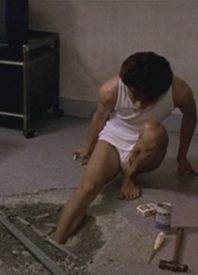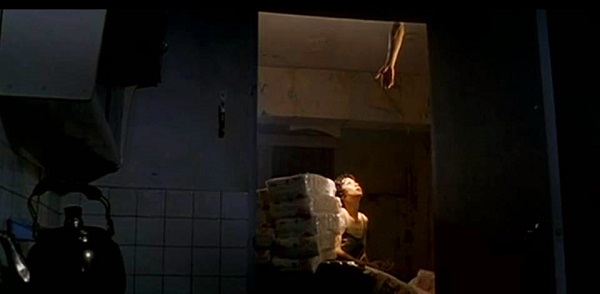
Tsai Ming-liang is one of the all-time great working filmmakers alive. That our slow king has returned to make a feature film entirely devoid of dialogue and emphasizing his signature durational style is one of the few bright spots of this miserable year. His films are these wonderfully befuddling masterworks of late 20th Century, postmodern art. They’re the kind of films that exemplify what Dutch Architect Rem Koolhaas refers to as embodying a concept called “junkspace.”
To cite my sources, this is an idea that I first encountered in University of Washington Film Professor James Tweedie’s eye-opening tome The Age of News Waves: Art Cinema and the Staging of Globalization. If you can track down that book and his follow-up Moving Pictures, Still Lives: Film, New Media, and the Late Twentieth Century, I highly recommend both for your apocalypse reading. If you have access to the original essay on Junkspace from Koolhaas himself, that would make for some fine material as well.
Allow me to butcher the concept of junkspace for a second here. Junkspace is ostensibly the “residue” (Koolhaas, 175) left behind from shifting modernization. It’s a concept that architecturally defines the impetus to congeal increased space into further spreading city blocks. The Path, in downtown Toronto, seems like a great example of this. It’s a network of formless, underground, shopping tunnels. There is no shape or substance, other than sprawling, upper-middle class, high-density mall space.
Do not take my word for this. It’s a concept of high-academia, and I can barely understand “The Cat in the Hat,” so what do I know. Tsai’s films, however, seem to provide a cinematic embodiment of these ideas. They take place in spaces that are decayed, decaying, or soon to be rendered obsolete. One, is legitimately an eighty-minute funeral dirge for a movie palace during its final screening that has, like, seven lines of dialogue or something because Tsai is a wild man.
The Hole makes for great apocalypse viewing, and thus, after you’ve worked your way through the necessary re-watch of Contagion, this should be the next target. All of the background exposition is provided via the audio of a news report. Taipei has been hit by a strange epidemic that makes people behave like insects. Blocks of the city streets are under complete quarantine. There will be no garbage removal, and the water will be cut off.
Living in this apartment is Tsai’s frequent collaborator Lee Kang-sheng, once again playing his alter ego Hsiao Kang. There is a hole in his apartment. He is the man upstairs. Below him lives Yang Kuei-mei, also a frequent Tsai collaborator. She is the woman downstairs. They get on each other’s nerves, but they also start to develop a connection.
One of Tsai’s frequent thematic impulses is an interrogation of isolation and connection. This is no different. But what makes Tsai wonderful is his ability to mine humour from the mundane. Hasio Kang attempting to remove a particularly pungent smell from his apartment by frantically waving his kitchen door is genuinely a wonderful movie moment.
Every morning I shoot my partner a text to see how she’s feeling and how she’s doing. We’re getting pretty close to the point where, if I am contagious, symptoms should start popping up. But the same goes for her, and my family, and her family, and my friends and so on. My anxieties are shifting away from my immediate needs to others. I’m trying to stay connected to her and the other people I love to the best of my ability. Really, all I want from my life is the ability to hold on tight to the people I love. The apocalypse doesn’t change this feeling.
The first couple of days were tough, don’t get me wrong, but I think the next few are going to be tougher. What happens in the next couple of days is going to determine the next few months. I never want to hear the phrase “flatten the curve,” ever again, but if we managed to even partially do it we’ll know very soon.
In light of such developments, this is a shorter piece today. I’m feeling okay. I hope that wherever you are, you are too.


